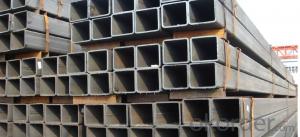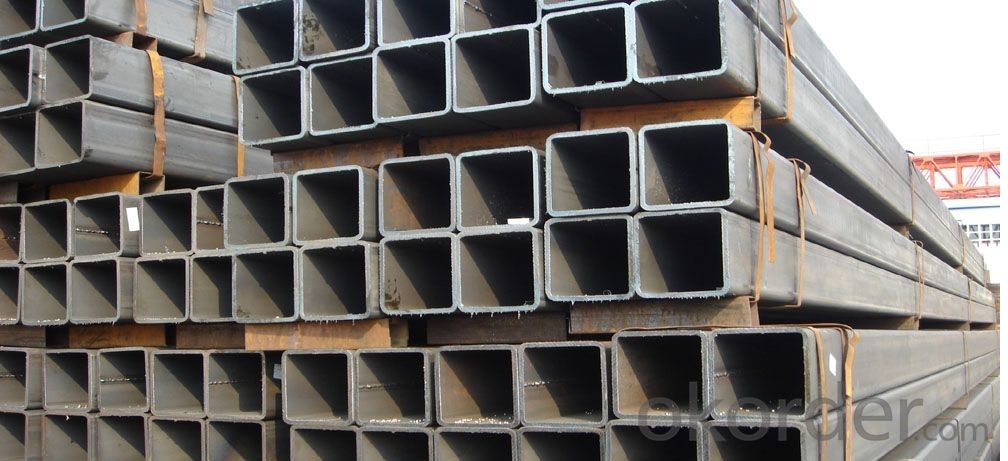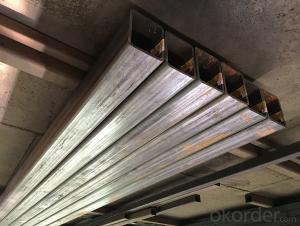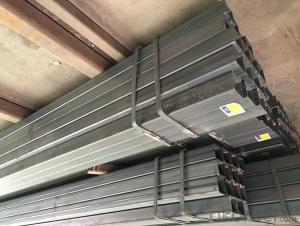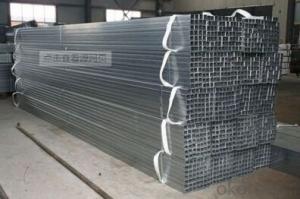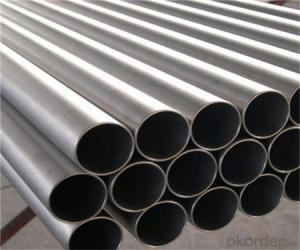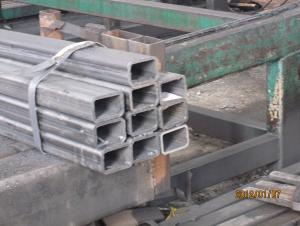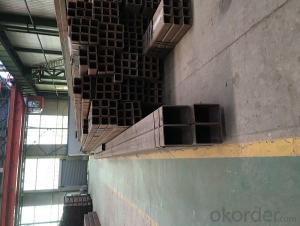Steel Pipe -- Rectangular Steel Tube Suppliers
- Loading Port:
- Tianjin
- Payment Terms:
- TT OR LC
- Min Order Qty:
- 25 m.t.
- Supply Capability:
- 9000 m.t./month
OKorder Service Pledge
OKorder Financial Service
You Might Also Like
1、Structure of Rectangular Steel Pipe API 5CT:
Rectangular Steel Tube is to be used for conveying gas, water, and petroleum foroil and natural gas industries. And used for structural steel pies purpose.We can provide you high quality production what you want and we sure we will give you price make you satisfied.
2、Main Features of Rectangular Steel Pipe API 5CT:
• High manufacturing accuracy
• High strength
• Small inertia resistance
• Strong heat dissipation ability
• Good visual effect
• Reasonable price
3、Rectangular Steel Pipe API 5CT: Specification:
Standard | GB, DIN, ASTM ASTM A106-2006, ASTM A53-2007 |
Grade | 10#-45#, 16Mn 10#, 20#, 45#, 16Mn |
Thickness | 8 - 33 mm |
Section Shape | Round |
Outer Diameter | 133 - 219 mm |
Place of Origin | Shandong, China (Mainland) |
Secondary Or Not | Non-secondary |
Application | Hydraulic Pipe |
Technique | Cold Drawn |
Certification | API |
Surface Treatment | factory state or painted black |
Special Pipe | API Pipe |
Alloy Or Not | Non-alloy |
Length | 5-12M |
Outer Diameter | 21.3-610mm |
Grade | 20#, 45#, Q345, API J55, API K55, API L80, API N80, API P110, A53B |
Standard | ASME, ASTM |
1) Material:20#(ASTM A 106/A53 GRB.API5LGRB,GB),45#,16Mn,10#.
2) Specification range:OD:21.3-610mm,WT:6-70mm,length:6-12m or according to the requirement of clients.
3) Excutive standards:GB,ASME API5L.ASTM A 106/A53,Despite of the above standards,we can also supply seamless steel pipe with standard of DIN,JIS,and so on,and also develop new products according to the requirements of our clients!
4) Surface:black lacquered,varnish coating or galvanized.
5) Ends:Beveled or square cut,plastic capped,painted.
6) Packing:bundles wrapped with strong steel strip,seaworthy packing.
4、Packaging & Delivery
Packaging Details: | seaworthy package,bundles wrapped with strong steel strip |
Delivery Detail: | 15-30days after received 30%TT |
5、FAQ of Rectangular Steel Pipe API 5CT:
①How is the quality of your products?
Our products are manufactured strictly according to national and internaional standard, and we take a test on every pipe before delivered out. If you want see our quality certifications and all kinds of testing report, please just ask us for it.
Guaranteed: If products’ quality don’t accord to discription as we give or the promise before you place order, we promise 100% refund.
②How about price?
Yes, we are factory and be able to give you lowest price below market one, and we have a policy that “ for saving time and absolutely honest business attitude, we quote as lowest as possible for any customer, and discount can be given according to quantity”,if you like bargain and factory price is not low enough as you think, just don’t waste your time.Please trust the quotation we would give you, it is professional one.
③Why should you chose us?
Chose happens because of quality, then price, We can give you both.Additionally, we can also offer professional products inquiry, products knowledge train(for agents), smooth goods delivery, exellent customer solution proposals.We sure will give you professional service and make you satisfied.
6、 Rectangular Steel Pipe API 5CT: Images:
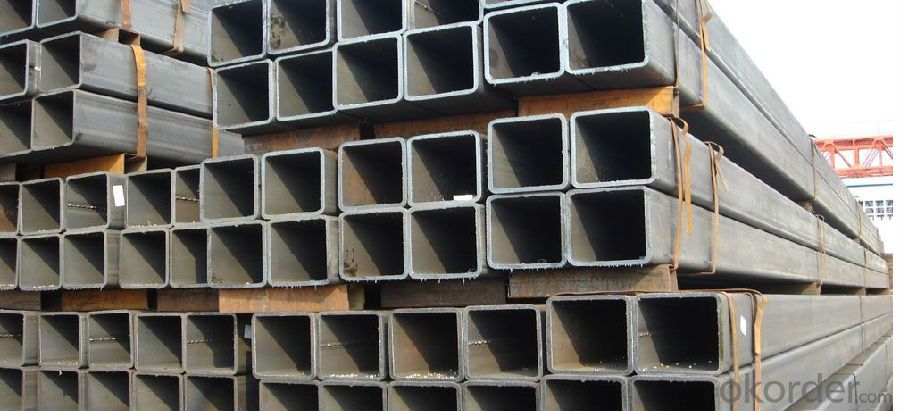
- Q: DN80 seamless steel tube, what is the standard thickness?
- Generally speaking, the diameter of the pipe can be divided into outer diameter, inner diameter and nominal diameter. Tubes are made of seamless steel tubes. The outer diameter of the tubes is indicated by the letter D, followed by additional outer diameter dimensions and wall thicknesses such as seamless steel tubes with an outer diameter of 108.
- Q: What is the difference between steel pipes and PVC pipes?
- Steel pipes are made from steel, which is a strong and durable material that can withstand high pressure and extreme temperatures. They are commonly used for transporting fluids and gases in industries such as oil and gas, construction, and plumbing. On the other hand, PVC pipes are made from polyvinyl chloride, a lightweight and corrosion-resistant plastic material. PVC pipes are more cost-effective, easier to install, and resistant to chemicals and corrosion. They are commonly used for drainage, irrigation, and plumbing in residential and commercial applications.
- Q: How are steel pipes used in the automotive exhaust system?
- Steel pipes are used in the automotive exhaust system to transport and expel the exhaust gases from the engine. They are durable and resistant to high temperatures, making them suitable for this purpose. Steel pipes are often bent and welded together to form the exhaust system, ensuring a smooth flow of exhaust gases and minimizing any leaks.
- Q: Can steel pipes be bent or curved?
- Yes, steel pipes can be bent or curved using specialized machinery and techniques such as cold bending, induction bending, or hot bending.
- Q: How are steel pipes threaded?
- Steel pipes can be threaded using a process called threading. Threading is the process of creating screw-like grooves on the outer surface of the pipe, which allows it to be connected to other pipes or fittings using threaded connections. There are several methods for threading steel pipes, including manual threading, electric threading machines, and hydraulic threading machines. In manual threading, a handheld pipe threading tool called a die is used. The die is placed on the outside of the pipe, and the pipe is rotated while pressure is applied to create the threads. This method is suitable for small diameter pipes and is typically used for on-site repairs or in small-scale operations. Electric threading machines are commonly used for larger diameter pipes. These machines consist of a motor-driven spindle, which rotates the pipe, and a die head that holds the threading dies. The operator simply feeds the pipe into the machine, and the threading dies cut the threads onto the pipe automatically. Hydraulic threading machines are similar to electric threading machines but use hydraulic power to rotate the pipe and create the threads. These machines are typically used for larger diameter pipes or in heavy-duty applications. Regardless of the method used, it is important to ensure that the pipe is properly prepared before threading. This may involve cleaning the pipe, removing any burrs or sharp edges, and applying a lubricant to reduce friction during the threading process. Overall, threading is a common and efficient method for creating threaded connections on steel pipes. It allows for easy assembly and disassembly of pipes and fittings, making it a popular choice in various industries such as plumbing, construction, and oil and gas.
- Q: Is the same specification seamless steel pipe more expensive than welded pipe?
- You need to see this in the interval that diameter, such as seamless pipe and welded steel tube 530*20 mm compared to 5450 yuan per ton, seamless pipe, welded steel pipe, which is 4550 yuan, small diameter 10*2 mm, seamless pipe will require far 10000 per ton, just need more than 6000
- Q: Are steel pipes suitable for use in sewage treatment plants?
- Yes, steel pipes are suitable for use in sewage treatment plants. Steel pipes are durable, corrosion-resistant, and can withstand high-pressure applications, making them an ideal choice for transporting and containing sewage in treatment plants. Additionally, steel pipes can be easily welded, allowing for seamless connections and minimizing the risk of leaks or contamination.
- Q: How are steel pipes tested for quality control?
- Steel pipes are tested for quality control through various methods such as visual inspection, dimensional checks, non-destructive testing, and mechanical testing. These tests ensure that the pipes meet the required standards and specifications, ensuring their structural integrity and performance.
- Q: What are the different standards for steel pipes?
- There are several different standards for steel pipes, including ASTM (American Society for Testing and Materials), API (American Petroleum Institute), and ASME (American Society of Mechanical Engineers). These standards specify the requirements for various aspects of steel pipes, such as their dimensions, chemical composition, mechanical properties, and testing procedures. These standards ensure that steel pipes meet the necessary quality and safety standards for their intended applications.
- Q: What are the different types of steel pipe supports for offshore platforms?
- There are several types of steel pipe supports used for offshore platforms, including clamps, brackets, hangers, and saddles. These supports are designed to secure and stabilize the pipes, ensuring their durability and integrity in the harsh offshore environment.
Send your message to us
Steel Pipe -- Rectangular Steel Tube Suppliers
- Loading Port:
- Tianjin
- Payment Terms:
- TT OR LC
- Min Order Qty:
- 25 m.t.
- Supply Capability:
- 9000 m.t./month
OKorder Service Pledge
OKorder Financial Service
Similar products
Hot products
Hot Searches
Related keywords
